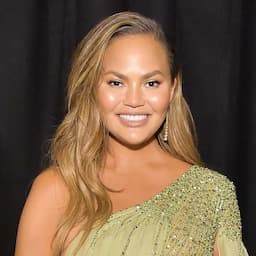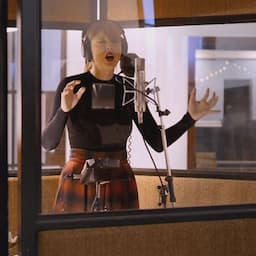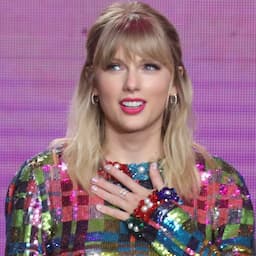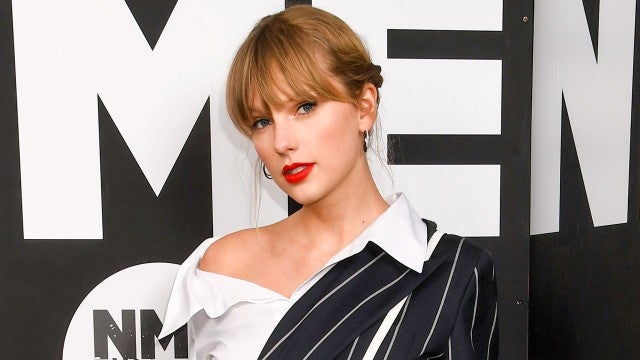The singer was honored as Billboard's Woman of the Decade on Thursday and delivered a passionate speech about her music rights battle.
Taylor Swift is not holding back when it comes to calling out Scooter Braun and the battle over artists' rights.
The Lover singer was honored with the Woman of the Decade award at the Billboard Women in Music Awards on Thursday, and she came out with a very powerful and forthright speech that reflected on her career over the past decade, and directly addressed her ongoing drama with Braun.
The lengthy, impassioned speech -- which touched on the prevalence of sexism in the music industry and the impact it's had on her career path -- addressed the fight for control of her master recordings when Swift raised an issue that played a central role in her music coming under the legal ownership of other people.
"Lately there has been a new shift that has affected me personally and that I feel is a potentially harmful force in our industry. And, as your resident loud person, I feel the need to bring it up," Swift said. "And that is the unregulated world of private equity coming in and buying up our music as if it was real-estate. As if it's an app or a shoe line."
"This just happened to me, without my approval, consultation or consent," Swift continued, referring to her old record label, Big Machine Records, being sold -- along with the masters it owned the right to -- to Braun's private equity company for a reported $300 million.
"After I was denied the chance to purchase my music outright, my entire catalog was sold to Ithaca Holdings in a deal that I'm told was funded by the Soros family, 23 Capital and the Carlyle Group," Swift said. "And yet, to this day, none of these investors have ever bothered to contact me or my team directly…. To ask me how I might feel about the new owner of my art."
"Scooter never contacted me or my team to discuss it prior to the sale or even when it was announced," The "ME!" singer continued. "I'm fairly certain he knew exactly how I would feel about it though."
Swift segued, for a moment, to seemingly recount some of the push-back she claims to have heard from professionals and executives in the music industry who defended Braun based on their experiences with the music manager and mogul.
"Let me just say that the definition of the toxic male privilege in our industry is people saying, 'But he's always been nice to me,' when I'm raising valid concerns about artists and rights to own their music," Swift said. "And of course he's nice to you! If you're in this room, you have something he needs."
"Private equity is what enabled this man to think, according to his own social media posts, that he could 'buy me,'" Swift stated. "But I'm obviously not going willing."
However, Swift made sure to share some praise for those who have come out in her defense, and in defense of the right for artists to control the work they create.
"The most amazing thing to discover was that it would be the women in this industry who would have my back, and show me the most vocal support at one of the most difficult times," Swift shared. "And I will never, ever forget it."
Toward the end of her speech, she also addressed her vocal fan base -- to whom she has appealed on more than one occasion during her public battle with Braun -- while marveling about the rise of social media over the last 10 years.
"I've seen fans become more engaged and supportive than ever before," Swift said. "I leaned on that support and it kept me in a place where, no matter what, I always wanted to keep making music for them."
She also reflected on how female artists have truly emerged as a powerful, driving force in the industry with more sales and more sway, despite what she feels has been institutionalized misogyny in so many different areas of the business.
"We have to grow fast. We have to work this hard. We have to prove we deserve this, and we have to top our last achievements… [we're] not allowed to coast. We are held to a higher, almost impossible-feeling standard," Swift said. "It seems that my fellow female artists have taken this challenge and they have accepted it. It seems like the pressure that could have crushed us made us into diamonds instead, and what didn't kill us actually did make us stronger."
As part of being named Billboard's Woman of the Decade, Swift also appeared on the cover magazine's "Women In Music" issue, out Dec. 14, where she addressed her feud with her old label at length.
"We need to think about how we handle master recordings, because this isn’t it," Swift shared. "I spent 10 years of my life trying rigorously to purchase my masters outright and was then denied that opportunity, and I just don’t want that to happen to another artist if I can help it."
"God, I would have paid so much for them!" Swift told Billboard. "Anything to own my work that was an actual sale option, but it wasn’t given to me."
In response, Swift has declared that she plans on re-recording and re-releasing her old hits as soon as she's contractually allowed so that she can have full control over her catalog.
"The reason I’m re-recording my music next year is because I do want my music to live on. I do want it to be in movies, I do want it to be in commercials," she explained, "but I only want that if I own it."
"It’ll feel like regaining a freedom and taking back what’s mine," she added. "When I created [these songs], I didn’t know what they would grow up to be. Going back in and knowing that it meant something to people is actually a really beautiful way to celebrate what the fans have done for my music."
RELATED CONTENT:




